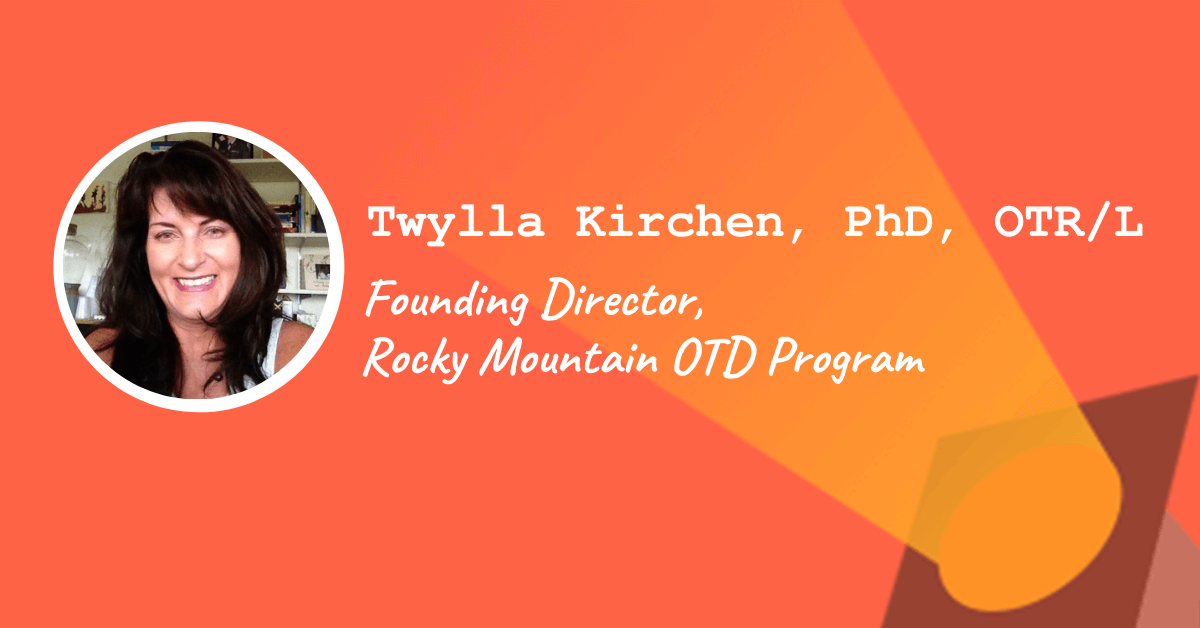Today’s non-clinical spotlight focuses on Twylla Kirchen, PhD, OTR/L, who went from occupational therapist to Occupational Therapy Program Director at Rocky Mountain College Occupational Therapy Doctorate Program.
This post may contain affiliate links or codes. This won’t increase your cost, but it helps keep TNCPT alive, and free of annoying ads! Thank you for your support. 🙂
What is your full name and title?
Twylla Kirchen, PhD, OTR/L, Founding Director of the Rocky Mountain College Occupational Therapy Doctorate Program in Billings, Montana
What year did you graduate from OT school, and where did you go?
I graduated from UNC Chapel Hill in 2001 with a MS in OT and in 2013 from Texas Woman’s University with a PhD in OT.
What did you do when you first got out of school? In what setting did you work, and what types of patients did you treat?
I worked in pediatric home health in rural North Carolina, which I would not recommend for any new graduate.
How long were you in that role?
I was in that role for less than a year because even with a mentor, I did not feel that as a new graduate, I was able to provide best-practice services to my patients.
What did you do next in your career?
I became a school-based OT and as a military spouse, I traveled the United States and worked in a variety of civilian and military-based school settings. From there, I began my PhD and transitioned into geriatric care (2010).
At what point were you able to work in an education setting? What was your foot in the door?
When I finished my PhD, I applied for a program director’s position at James Madison University and was hired in June of 2014.
Did you have to do anything special to your resume/cover letter to land that first education job?
I think the fact that I had been a commander in the Army and had program development and leadership experience was helpful.
How did you become the director of the James Madison University OT program?
See above
What was your role like at that job?
It was a steep learning curve. Resources were limited, but the students and OT program faculty and staff were amazing.
At what point did you wind up launching this new OTD program at Rocky Mountain College?
I felt a bit stifled by the lack of resources and the red tape associated with making changes in a public institution, and I wanted to go home.
I am a fifth generation Montanan. My parents are aging, and it was the right transition, both personally and professionally.
How did you land this current role as Occupational Therapy Program Director? Through connections, or did you apply for the role?
I initiated contact with Rocky Mountain College and asked them if they would be interested in hosting and Occupational Therapy Doctorate Program.
Within hours, I heard back from them. Within months, I flew to Montana and proposed the program to the Rocky Mountain College Board of Directors, and I wasn’t finished with my program when they were completely on board.
Did you get any special certifications or training along the way to help you land this role?
No-but it is important to be familiar with the ACOTE accreditation process. I have attended training in the past and I attend the AOTA Education Summits and conferences each year, which include an academic leadership component.
Recently, I applied to the AOTA Academic Leadership Institute, which is a year-long training commitment, but I do not know if I will be selected.
What is a day or week in the life like for you?
My main focus now is moving the program through accreditation, hiring faculty, building program course content, networking with community-based resources and filling the first class of students.
What have been the challenges and rewards of this move?
I developed the RMC OTD Program while serving as the program director at JMU. I worked many late nights and weekends to do so and it was difficult to build connections and relationships from a distance.
It is incredibly rewarding to build a program from the ground up. The sky is the limit.
Montana has the second fewest OTs in the country and there is so much opportunity to meet needs and grow the profession here, and serve the next generation of students who are excited to become occupational therapists.
Do you still treat patients, or are you fully immersed in the academic world?
During the time that I worked at JMU, I worked in a SNF on weekends. I do believe that it is important to practice when teaching.
I plan to work in mental health here in Montana. The need is tremendous and it will enhance learning opportunities for our students, as well as keep me current.
What would you recommend to someone who is considering going into education?
You really have to love teaching because it is more challenging than one would imagine. Students respond when they know you care and it is amazing to know that you are influencing the future of the profession.
Are you currently hiring therapists for your new program?
Would you consider assistants for your roles in education?
How should interested candidates apply for roles?
Anything else you’d like to share?
These are my students and colleagues at JMU. I miss them, and I am so proud of them!
Thanks for your insight, Twylla!




